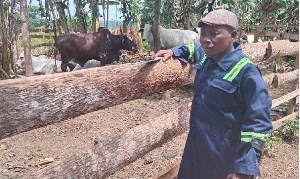Chief Superintendent Jones M. Blantari of the Ghana Police, has encouraged Ghanaians to engage more in research in HIV and AIDS in order to market the country’s best practices and innovativeness at the international scene.
He noted that Ghana was not branded enough in the area of HIV and AIDS activities as compared to other countries in the African region like Nigeria, Zambia, Uganda, South Africa, Kenya and Zimbabwe.
“We are doing so many activities just like these countries but the only difference is that they do more research than we do”.
Chief Superintendent Blantari, who is the Programme Coordinator and Head Counselor of the Ghana Police Service AIDS Control Programme, was talking at the just ended 19th World AIDS Conference held in Washington in an interview with the Ghana News Agency.
The Conference, which was on the theme: “Ending the Pandemic: Turning the Tide Together” was held in the United States of America for the first time in 22 years after the Obama administration lifted the travel ban of HIV persons.
More than 23,000 participants and 2,000 journalists from 200 countries attended the historic conference at the Walter E. Washington Convention Centre here in Washington, D.C. of the USA.
The six-day biennial conference, which was the largest regular conference on any health or development issue, was convened by the International AIDS Society in partnership with UNAIDS, the Global Network of Persons Living with HIV and other stakeholders.
Superintendent Blantari said though Ghana was rated high by the Global Fund, it was not showing and reflecting on the international scene. This was realized at the conference.
He called on the Ghana AIDS Commission, the National AIDS Control Programme as well as other stakeholders in the HIV/AIDS to take advantage of the US President’s Emergency Plan for AIDS Relief (PEPFAR) awards of a $60 million initiative to support the implementation of science research and the evaluation of programmes PEPFAR, which was announced a week ago.
He explained that Ghana was a beneficiary of PEPFAR and therefore qualified to access the award for research.
The PEPFAR initiative contributes to the evidence-based for HIV programmes and maximizes the impact of its investments in programmes around the world.
Data gathered will help partner countries to strengthen their efforts to prevent new HIV infections and save lives.
The implementation of the science awards would address a wide variety of topics, including improving the clinical management of tuberculosis and opportunistic infections, providing treatment and care services for key populations such as prisoners, assessing innovations in laboratory and diagnostics.
It will also address areas like evaluating the impact of community savings and loan group models on child and household well-being, the impact of revised HIV infant feeding guidelines on HIV-free child survival and establishing linkages between testing and other HIV services.
Funding opportunities will emerge from research priorities identified by the Office of the US Global AIDS Coordinator and recommended by the PEPFAR Scientific Advisory Board.
Ms Esi Awotwi, UNFPA’s HIV and AIDS Focal Person expressed the regret that the technical people in the field of HIV and AIDS could not take part in the historic conference due to funding and called for the need to re-look HIV and AIDS programmes with much emphasis on research.
Mrs Cecelia Senoo-Loduno, immediate Past President for the Society for Women Against AIDS, called on government to exhibit political commitment to HIV and AIDS activities to market the achievements made in the international scene.**
Health News of Sunday, 5 August 2012
Source: GNA












